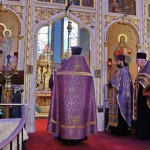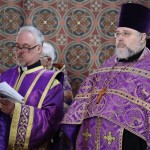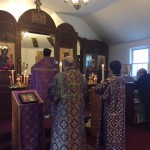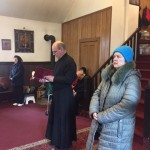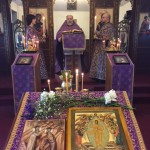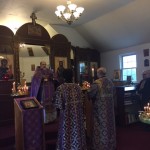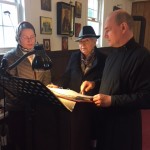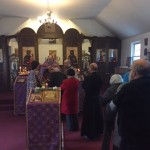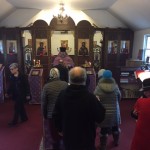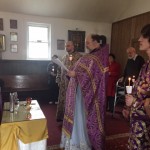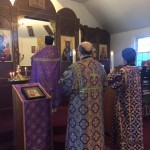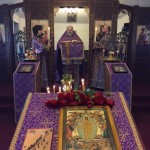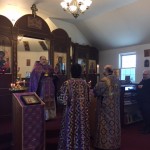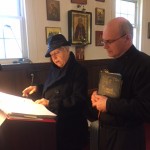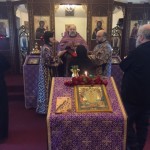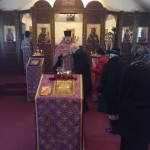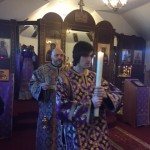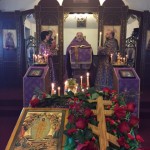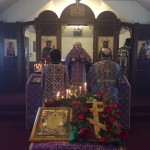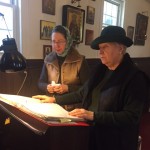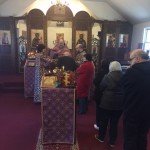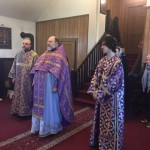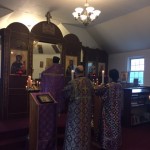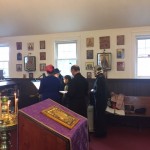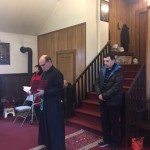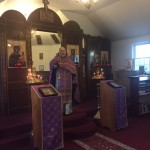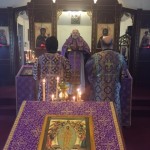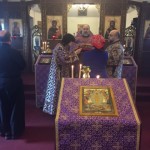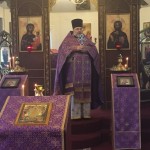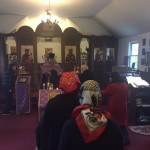On March 25, on the Fifth Sunday of Lent our parishioners gathered for a liturgical celebration in our temple. Rector of St. George Church, Archpriest Igor Tarasov served the Divine Liturgy. Following the Gospel lesson he preached the following homily in English:
“Dear brothers and sisters in Christ! The time of Lent calls us for a special care for the spiritual matters. And if we begin to pay attention to the works of piety and ourselves engage in them, we may have certain temptations. One of such temptations is to see the spiritual shortcomings of others and a desire to correct them.”
“For instance, if members of our family don’t go to the church, we may try to make them go. And we may be disappointed if they don’t listen to us. Then we may be unhappy looking everywhere around us. The world outside of the temple has a very little care about Orthodox faith, about spiritual life, about our fasts and holy days. And we may begin to think that it is the society’s fault, that the government should be different, that meat products should be prohibited to sell and entertainment should be banned during Lent. We may recall that how good it was centuries ago, in the Orthodox Byzantine or Russian Empire. And if we give in to such thoughts, we may go further and imagine how we would act if we had the power: we would correct everything and we would make everyone a pious Christian. And thus we forget about our own soul, about our own shortcomings and about our own correction. This temptation is very common, and I believe, many of us could not avoid it.”
“Today we heard the Gospel lesson in which our Lord Jesus Christ predicts His sufferings in Jerusalem. He tells His Disciples about His future endeavor of humiliation and death that He has to accomplish. In this way our Savior tells us that this is the only way to overcome evil – the way of sacrifice, the way of love, the way of service to others. Our Lord came into the world and did not destroy His enemies, did not eliminate bad people and did not force everyone to be kind. He did not become a ruler of the world, some king or an emperor who would make the laws to command everyone to be religious. He did not do it. He came to suffer, to be humiliated, and, finally, to die on the cross.”
“Why this way is the only one? Because we became so attached to sin and sin became so rooted in our hearts, so if the Lord would decide to destroy the evil, to eliminate the sin, He would totally destroy our souls. They would be annihilated and we would perish. But the Lord chose the only right way – to heal our souls. He chose to suffer with us, to be tempted with us and to die for us. But He dies to rise from the dead and to resurrect us, to raise us up renewed, purified, reborn and freed from sin. As He taught, “God did not send His Son into the world to condemn the world, but that the world through Him might be saved” (Jn. 3, 17).”
“We often like to eliminate evil, to eradicate the vices and crimes and we may think that in order to do it, we need to destroy, to punish and to execute. And many human societies and human leaders follow that path. This way seems to be easy but is a wrong idea of overcoming evil. The wise men of the world knew it long ago. The ancient Roman writer, Cornelius Tacitus understood how wrong is to gain a victory by destroying your enemy. He wrote that such victors “create a desert and call it peace”. Fighting evil by evil, killing your enemy is showing your weakness, your inability to find a better way. All of us may be good or evil, thus we are no better than our enemies. And if think we are good but kill our enemy, we deprive him of an opportunity to change for better. Instead, we are called to wake up good which is rooted in us and in all the others. That might be the true victory.”
“Our Lord Jesus Christ acted in that way, the only right way. He tells His Disciples about that endeavor of Redemption through sufferings and death, not through the destruction. He also teaches them to serve each other. He reverses common social order and proclaims the new rule: “Whoever desires to become great among you shall be your servant. And whoever of you desires to be first shall be slave of all” (Mk. 10, 43-44). This is another surprising principle and different from what we are accustomed to see among the people. But our Lord Himself followed that path and He was successful. He said, “The Son of Man did not come to be served, but to serve, and to give His life a ransom for many” (Mk. 10, 45).”
“Dear brothers and sisters! No power or authority, no order or command can make us follow Christ. Today we honor Venerable Mary of Egypt who was a great sinner but became a great Saint. She lived sinful and immoral life before she repented. But could any law or command force her to repent and to change her lifestyle? She changed due to the grace of God. And today we have different laws against such immoral lifestyle like prostitution; these laws help but they cannot make any harlot to change, to become a Saint. Our Savior came not to force us but to serve us, to sacrifice His life for us, so we may become His followers and do the same for our brethren. And although we may be sad seeing members of our family, our friends or other people around us not being Orthodox or not living religious life, not caring for their salvation, the only right way to convert them is to serve them to show them our love, compassion, and mercy. The only right way is to pray for them, so the Lord may lead them into a right direction. Let us then ask our Lord, the Savior of the world who came to not to condemn but to save, and who suffered for our sake, let us ask that He may grant us to follow this only right path to salvation!”
The choir prayerfully performed penitent hymns during the preparation for Holy Communion.
Following the dismissal of the Liturgy the Rector preached a short sermon in Russian stressing the main ideas of his English homily. He also made announcements about the future celebrations of the Holy Week and Pascha.
After the Divine Liturgy the Rector performed the Sacrament of the Anointing of the sick. All persons who desired to receive that Mystery participated in the service and were anointed with the blessed oil.

